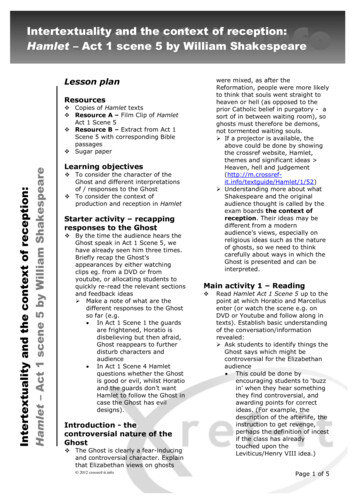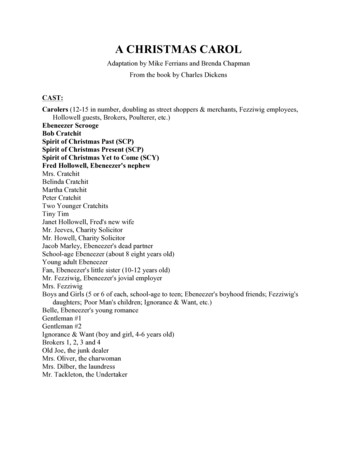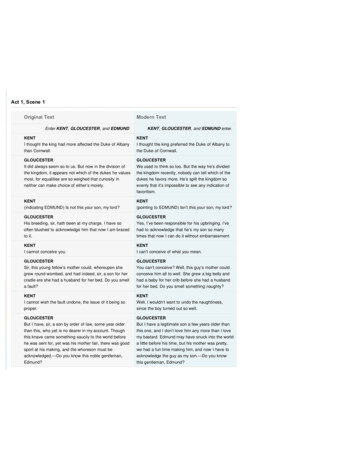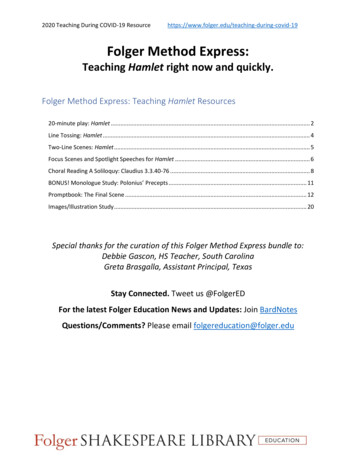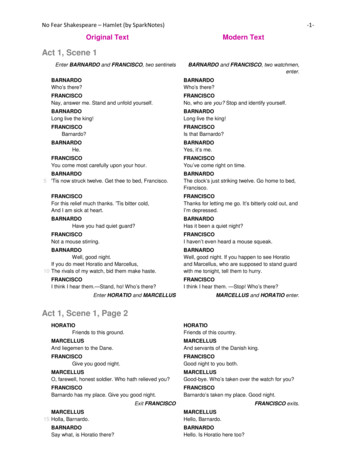
Transcription
HAMLET - ACT 3SCENE 2www.aoifesnotes.com
HAMLET AND THE PLAYERSWe are dropped straight into theactionHamlet instructs the players how toact and we see how cultured andintelligent he isShakespeare may also be using Hamletto express his - Shakespeare’s - ownview of the rather pantomime style ofacting which was still common at thetime the play was written and wasShakespeare’s competition in thetheatres of London
Traditionally, actors playing villains hammed it upand shouted their lines out as loudly as possible,to prove their villainy.Hamlet wants the actors to behave morerealistically.Termegant was wrongly believed by mediaevalChristians to be a violent Muslim god and wouldtherefore be hugely and loudly over-acted toprove his villainy to a Christian audience!
VOCABULARY LESSON‘Termegant’ is now used todescribe a violent,quarrelsome, overbearingwoman.
CONTRADICTIONHamlet calls for restraint in the acting of theplay, but this is at odds with his earliercomments in his soliloquy (Act II Scene ii) inwhich he said how impressed he was by thepassion of the actor who was so moved byHecuba’s anguish
Hamlet thinks little or nothing of the commonpeople, scorning the ‘groundlings’ for theirdelighted reaction to clownish, over-acted plays.He also disparages tradesmen, saying that theactors are so dreadful that they appear less thanhuman and seem to have been made by unskilledapprentices rather than by Nature.Hamlet is an intellectual and seems to have a lowopinion of ordinary people.
HORATIO AND FRIENDSHIPFalse friend - Rosencrantz andGuildenstern - are sent awayTrue friend - Horatio - is welcomedNote the qualities in Horatio thatHamlet values: reasonable, honest,cheerful, sensible and not ‘passion’sslave’.Does Hamlet possess thesequalities? Is Horatio a foil to him?Horatio is once again asked to bethe credible and honest witness.
HAMLET AND CLAUDIUSHamlet feigns madness once more but there is a point towhat he says to ClaudiusHe plays with the words ‘air’ and ‘heir’, showing that hedoes not believe Claudius will make him his heir and thathis promises are as empty as airChameleons change to blend in, just as Claudius has done(It was believed at the time that chameleons lived on air.)
HAMLET AND POLONIUSPolonius says that he once played the part ofCaesar in a playThis might be a bit of an in-joke, as the actor whooriginally played the role of Polonius - JohnHemmings - had recently played the role of JuliusCaesar
HAMLET AND OPHELIAHamlet is incredibly crude in his dealings with Ophelia, asking ifhe can lie in her lap, which might mean ‘Can I have sex with you?’and when she refuses, pretends that all he meant was lie down onher lap.He plays on words such as ‘country’ and ‘nothing’ to make her feeldeeply uncomfortable. He emphasises the first syllable of the word‘country’ (which meant then what it does now) and his reference to‘thing’ and ‘nothing’ mean penis and vagina respectively.Poor Ophelia is damned if she understands his references anddamned if she does not
Ophelia says it is ‘twice two months’ - or fourmonths - since Old Hamlet has diedThis shows us that some time has passed sinceAct 1, in which we learned that it was two monthssince Old Hamlet diedHamlet sarcastically says that if it is a full fourmonths, then of course they should forget hisfather and move on
THE PLAY - DUMBSHOW (SHORT MIME WHICHSUMMARISES THE PLOT OF THE PLAY TO COME)Ophelia seems alone in having taken in what the dumbshowrepresentsMany critics have speculated on the reason for Claudius notreacting to the dumbshow. Perhaps he is too skilled an actorhimself to react, or perhaps he was talking to Gertrude andPolonius and did not see it at all.
Ophelia asks Hamlet if the actor who reads thePrologue will ‘show’ or explain what the playmeans.Hamlet crudely replies that the actor will tell herwhat anything she ‘shows’ him means. He isimplying that Ophelia might be the sort of personto show the actor some intimate part of herself.Ophelia says Hamlet is being obscene, and turnsto watch the play rather than listen to him.
THE PROLOGUEThis was a dramatic device to givethe audience the essence of theplay. Shakespeare used it inRomeo and Juliet but afterwardsabandoned it, assuming by thenthat his audience was capable ofunderstanding what was going onin the play.Hamlet is disgusted that theprologue is so brief, comparing itsthree-line length to a shortinscription on the inside of a ring.
THE PLAYER KING AND QUEENThe player queen loves her husband and, likeGertrude and Old Hamlet, they have been marriedthirty yearsThe reference to the plot to kill the king beginsThe player queen rejects her husband’s suggestionthat she may remarry after his death. She says thatany woman who would take a second husband wouldhave to have conspired to kill her first husband.
Hamlet remarks that these words are like‘wormwood’, which is a bitter herb used inmedicine but which can also be a poison.He is suggesting that Gertrude and Claudius willfind the player king and queen’s words bitter andmaybe even poisonous.
GERTRUDE - IS SHE GUILTY?The ghost told Hamlet notto punish GertrudeThe player queen says thatif she kissed her secondhusband in bed it would belike killing her firsthusband all over again
The player king tells his wife that time changes allemotions and that firm intentions may weakenover time, just as firm apples may ripen and fallfrom the tree.The player queen promises she will never remarry,but Hamlet wonders if she can keep her word.He is obviously hoping that Gertrude andClaudius are watching the events as they unfold.
GERTRUDE AND CLAUDIUS REACTGertrude does not see thatthe play mirrors her ownsituation in any way, as sheis innocent.Hamlet probably makes upthe plays name - TheMousetrap - to show thatthe play is aimed at trapping‘the conscience of the King’
THE MURDER OF GONZAGOBased on a true story, andpossibly the inspiration forShakespeare’s ClaudiusIn 1538, the Duke ofUrbino, who married intothe Gonzago family, wasmurdered by LuigiGonzago who pouredpoison in his ear.
Claudius asks Hamlet about the play and Hamlettells him there is nothing offensive at all in it. Hesays it might bother the guilty but as neither henor Claudius are guilty of anything, they havenothing to fear.Lucianus, the King’s nephew, enters.Hamlet is impatient for the action to moveswiftly
THE PLOT HAS WORKEDWhen Lucianus pourspoison in the King’s ear,Claudius rises and leaves.Gertrude leaves too,although she has no ideawhat is going on.Everyone but Hamlet andHoratio leave.
HAMLET’S REACTIONHe is delighted that his plan has workedHamlet sings of Damon and Pythias who showed just how loyalfriends could be. (In the Ancient Greek story, Pythias wasaccused of plotting agains Dionysius, the tyrannical ruler ofSyracuse, and sentenced to death. He asked to be allowed toreturn home to settle his affairs, but Dionysus refused, believinghe would never return. Damon offered to stand in his place andface execution if Pythias did not return. Pythias did return, andan impressed Dionysius freed them both.)This song is a reference to Horatio’s loyalty
PROOFNow Hamlet knows that the Ghost spoke thetruthTherefore, he should act!
GERTRUDESends Rosencrantz andGuildenstern to Hamletwith a messageClaudius is in a rageGertrude is bewildered byHamlet’s behaviour andwants to see him in herroom
Hamlet uses the royal ‘We’ when talking toRosencrantz and Guildenstern.He is confident and princelyHamlet feels he could be kingHe takes Guildenstern aside and, taking arecorder from the musicians, asks him to play it
Guildenstern says he cannot and Hamlet pretendsto be surprised, saying that Guildenstern playedhim, Hamlet, like an instrument when he tried totrick and manipulate him.Hamlet shows that he is not mad at all and makesit clear that he will not be ‘played’ byGuildenstern
HAMLET AND POLONIUSPolonius plays along withHamlet’s mockery because he,Hamlet, is a prince and agreeswith everything he says.Our final meeting withPolonius cements the idea ofhis being a sycophantichypocriteHamlet says he will go toGertrude’s room
HAMLET’S SOLILOQUYHamlet is so furious he coulddrink hot blood and cause anearthquakeHe calms himself in order to visithis motherHamlet believes his mother isguilty of moving on too fast butdoes not want to be as hard asNero who had his mother killedfor murdering his - Nero’s - fatherand marrying the dead man’sbrother
Hamlet sings of Damon and Pythias who showed just how loyal friends could be. (In the Ancient Greek story, Pythias was accused of plotting agains Dionysius, the tyrannical ruler of Syracuse, and sentenced to death. He asked to be allowed to return h


